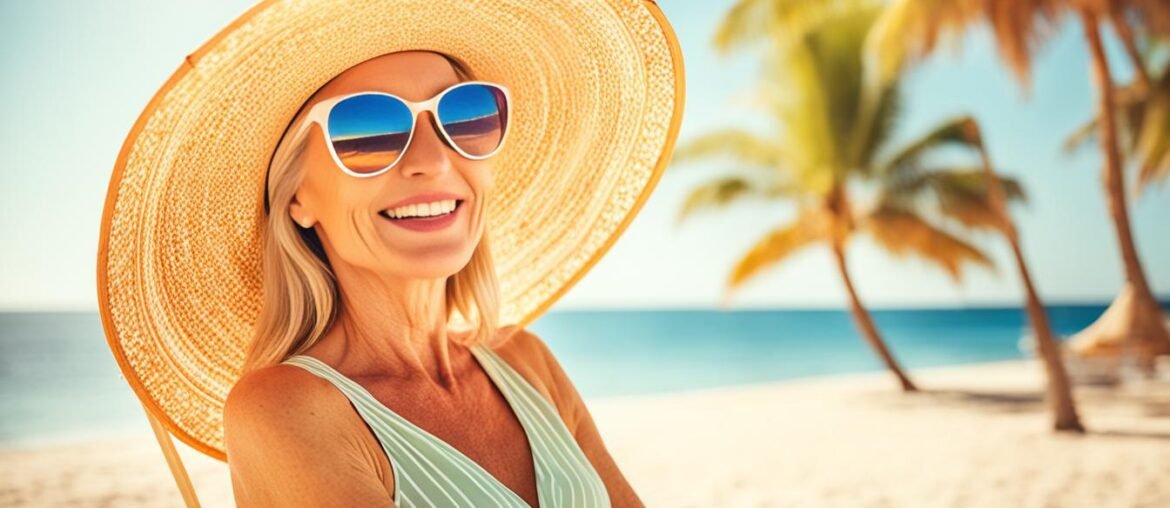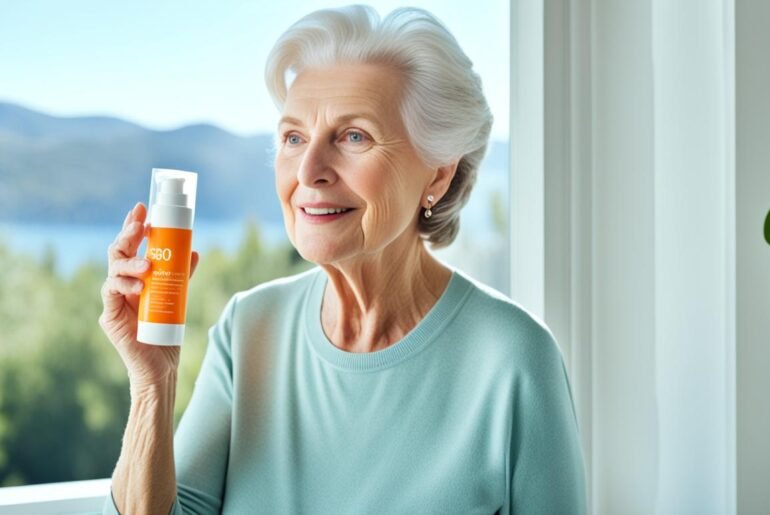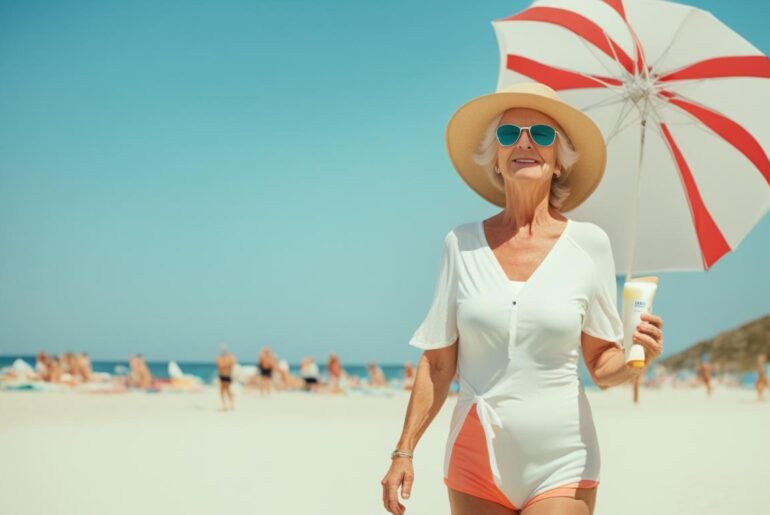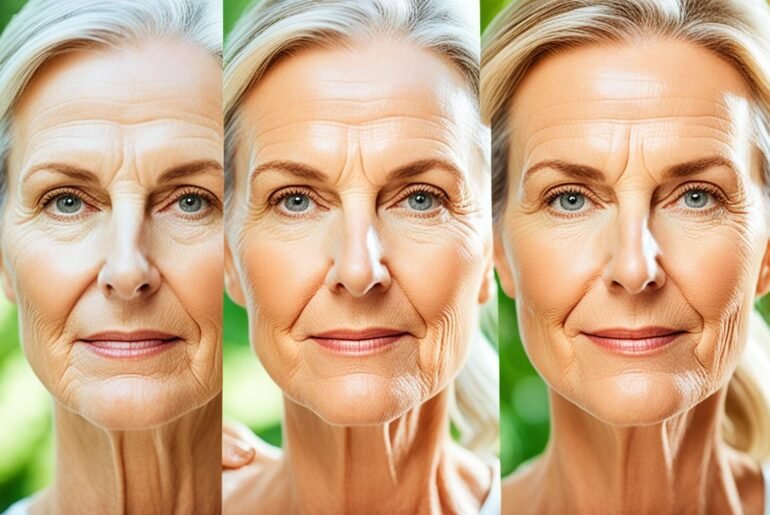Did you know that sun exposure is responsible for up to 90% of the signs of aging in the skin? That’s right, those wrinkles, fine lines, age spots, and loss of elasticity can all be attributed to the damaging effects of the sun’s UV rays. But don’t worry, there are effective ways to protect your aging skin from further damage and maintain a youthful appearance.
UV protection is crucial for maintaining the health and appearance of aging skin. By incorporating sunscreens specifically designed for aging skin into your skincare routine, you can shield your complexion from harmful UV rays and prevent premature aging. But it’s not just sunscreen that can help. Implementing other anti-aging skincare products and practices can further support the health and appearance of your aging skin.
Key Takeaways:
- UV exposure is responsible for up to 90% of the signs of aging in the skin.
- Protect your aging skin by using sunscreens specifically designed for mature skin with broad-spectrum protection and a minimum SPF of 30.
- Incorporate other anti-aging skincare products and practices into your routine to support the health and appearance of aging skin.
- Choose sunscreens that contain additional ingredients like antioxidants and moisturizers to nourish and hydrate the skin.
- Consult with a dermatologist for personalized recommendations on UV protection for your specific skin needs.
The Effects of UV Radiation on Aging Skin
UV radiation from the sun is a leading cause of skin aging. Over time, exposure to UVA and UVB rays can break down collagen and elastin fibers in the skin, leading to the formation of wrinkles and a loss of elasticity. UV radiation also contributes to the development of age spots or dark spots on the skin. By protecting the skin from these harmful rays, it is possible to minimize the visible signs of aging and maintain a more youthful appearance.
UV radiation has a profound impact on the skin, accelerating the aging process and causing various skin concerns. Let’s take a closer look at the specific effects of UV radiation on aging skin:
1. Wrinkles and Fine Lines
UV radiation penetrates the skin and damages collagen and elastin fibers, which are responsible for maintaining its firmness and elasticity. As these fibers degrade, the skin becomes less resilient and more prone to the formation of wrinkles and fine lines.
2. Loss of Skin Elasticity
Repeated exposure to UV radiation weakens the skin’s collagen and elastin, resulting in a loss of elasticity. This can cause the skin to sag and appear less supple and youthful.
3. Age Spots
UV radiation triggers the production of excess melanin, leading to the development of age spots or dark spots on the skin. These spots are typically concentrated on areas exposed to the sun, such as the face, neck, and hands.
4. Skin Thinning
UV radiation can also thin the skin by damaging the underlying blood vessels and cells responsible for its thickness. Thinning skin is more susceptible to damage and can make the signs of aging more pronounced.
5. Reduced Skin Barrier Function
Excessive UV exposure weakens the skin’s natural barrier function, making it more vulnerable to environmental stressors, pollutants, and moisture loss. This can further accelerate the aging process and contribute to the development of various skin conditions.
In order to protect the skin from the detrimental effects of UV radiation, it is crucial to adopt a comprehensive approach to sun protection. This includes wearing broad-spectrum sunscreen with a high SPF, seeking shade during peak sun hours, and wearing protective clothing and accessories. By incorporating these measures into your daily routine, you can help safeguard your skin against UV-induced aging and maintain a youthful complexion.
| Effects of UV Radiation on Aging Skin | Prevention Strategies |
|---|---|
| Wrinkles and Fine Lines | Apply sunscreen daily and use products containing retinoids to promote collagen production. |
| Loss of Skin Elasticity | Protect the skin from direct sun exposure and consider using products with ingredients like peptides and hyaluronic acid. |
| Age Spots | Wear sunscreen with a high SPF and regularly exfoliate the skin to reduce the appearance of age spots. |
| Skin Thinning | Avoid prolonged sun exposure and use moisturizers with ingredients like ceramides to strengthen the skin barrier. |
| Reduced Skin Barrier Function | Use gentle cleansers and moisturizers to protect and nourish the skin barrier, and include antioxidants in your skincare routine. |
Strategies for Preventing Skin Aging

Incorporating effective strategies into your skincare routine can help prevent or minimize skin aging. One of the most important strategies is to protect your skin from the sun’s harmful UV rays. This can be achieved by wearing sunscreen daily, seeking shade during peak sun hours, and wearing protective clothing, such as hats and sunglasses. Additionally, adopting a healthy lifestyle that includes a balanced diet, regular exercise, adequate hydration, and quality sleep can also support skin health and delay the signs of aging.
When it comes to preventing skin aging, sun protection is key. The sun’s UV rays are a major contributor to premature aging, causing wrinkles, fine lines, age spots, and a loss of elasticity. By wearing sunscreen with at least SPF 30 and broad-spectrum protection, you can shield your skin from harmful UV radiation and reduce the risk of sun damage.
Furthermore, incorporating an anti-aging skincare routine into your daily regimen can help keep your skin looking youthful and radiant. This routine may include cleansing, toning, applying serums with active ingredients like retinol or hyaluronic acid, and moisturizing with products specifically formulated for mature skin.
In addition to skincare, making certain lifestyle changes can have a positive impact on your skin’s health and aging. Maintaining a balanced diet rich in antioxidants, vitamins, and minerals can nourish your skin from within. Regular exercise promotes good blood circulation, which delivers essential nutrients to the skin and helps maintain its elasticity. Staying hydrated helps keep your skin moisturized and plump, while quality sleep allows your skin to repair and regenerate.
Remember, prevention is key when it comes to skin aging. By implementing a comprehensive approach that includes sun protection, an anti-aging skincare routine, and healthy lifestyle habits, you can maintain youthful, glowing skin for years to come.
Sun Protection Tips:
- Apply sunscreen with at least SPF 30 and broad-spectrum protection
- Reapply sunscreen every two hours, or more frequently if sweating or swimming
- Seek shade during peak sun hours, typically between 10 am and 4 pm
- Wear protective clothing, including hats and sunglasses
Lifestyle Changes for Youthful Skin:
- Maintain a balanced diet rich in antioxidants, vitamins, and minerals
- Incorporate regular exercise into your routine for good blood circulation
- Stay hydrated by drinking an adequate amount of water
- Ensure quality sleep to allow your skin time to repair and regenerate
| Sun Protection Strategies | Benefits |
|---|---|
| Wearing sunscreen daily | Protects skin from UV radiation |
| Seeking shade during peak sun hours | Reduces direct sun exposure |
| Wearing protective clothing | Provides physical barrier against UV rays |
| Maintaining a balanced diet | Nourishes skin with essential nutrients |
| Regular exercise | Promotes good blood circulation to the skin |
| Adequate hydration | Keeps skin moisturized and plump |
| Quality sleep | Allows skin to repair and regenerate |
The Importance of Sunscreen for Aging Skin
When it comes to maintaining the health and appearance of aging skin, sunscreen should be an integral part of your skincare routine. Sunscreen plays a crucial role in protecting the skin from the damaging effects of UV radiation, which is a major contributor to premature aging. By incorporating sunscreen into your daily regimen, you can reap numerous benefits for your mature skin.
One of the key benefits of using sunscreen is its ability to prevent sunburn. Sunburn damages the skin and can accelerate the signs of aging, such as wrinkles and fine lines. By applying sunscreen with a high SPF rating, you can shield your skin from harmful UVB rays and reduce the risk of sunburn.
Furthermore, sunscreen helps reduce the risk of skin cancer, which is a significant concern for aging individuals. Prolonged exposure to UV radiation increases the chances of developing skin cancer, including melanoma. By regularly using sunscreen, you can protect yourself from these risks and promote the long-term health of your skin.
In addition to these protective effects, sunscreen also offers anti-aging properties. UV radiation is known to break down collagen and elastin fibers in the skin, leading to the formation of wrinkles and a loss of elasticity. By using sunscreen with broad-spectrum protection, you can minimize these effects and maintain a more youthful complexion. Look for sunscreens specifically formulated for mature skin, as they often contain additional ingredients such as antioxidants and moisturizers to nourish and hydrate the skin.
The role of sunscreen in preventing premature aging cannot be overstated. By providing a barrier against UVA and UVB rays, sunscreen helps to prevent the development of age spots, fine lines, and other signs of sun damage. Regular use of sunscreen can keep your skin looking radiant, smooth, and youthful.
The Role of Sunscreen Standards and Guidelines
It is important to note that not all sunscreens are created equal. When selecting a sunscreen for aging skin, it is essential to choose one that provides broad-spectrum protection against both UVA and UVB rays. Look for a sunscreen with a minimum SPF of 30, as this will offer adequate protection against the sun’s harmful rays. Additionally, consider consulting with a dermatologist to determine the best sunscreen for your specific needs and skin type.
| Sunscreen | SPF | Key Features |
|---|---|---|
| EltaMD UV Clear SPF 46 | 46 | Oil-free formula, suitable for sensitive skin |
| Supergoop Unseen Sunscreen SPF 40 | 40 | Lightweight, invisible finish |
| Isdin Eryfotona Actinica Sunscreen SPF 50+ | 50+ | Photodamage repair and prevention |
Remember, sunscreen should be applied generously to all exposed areas of the skin and reapplied every two hours or more frequently if sweating or swimming. By making sunscreen a non-negotiable part of your skincare routine, you can protect your aging skin from premature aging and maintain a healthy, vibrant complexion.
Choosing the Right Sunscreen for Aging Skin
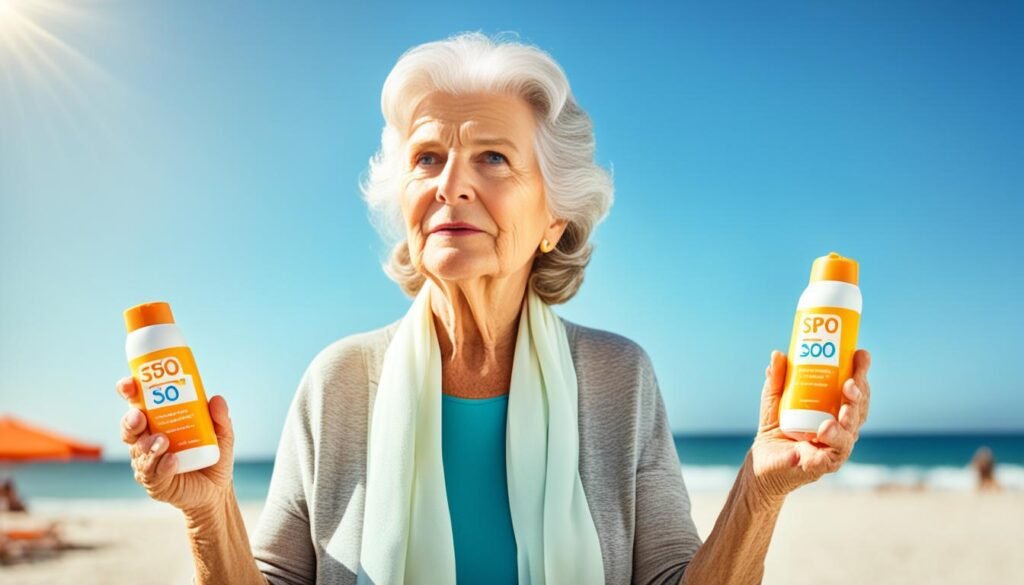
When it comes to protecting aging skin from the harmful effects of the sun, choosing the right sunscreen is crucial. There are several factors to consider when selecting a sunscreen that will provide the best protection and care for your skin.
First and foremost, look for a sunscreen that offers broad-spectrum protection. This means that it will shield your skin from both UVA and UVB rays. UVA rays are responsible for premature aging, while UVB rays are the main cause of sunburn. By opting for a broad-spectrum sunscreen, you can ensure that your skin is protected from both types of damaging rays.
Another important factor to consider is the formulation of the sunscreen. There are two main types: mineral and chemical sunscreens. Mineral sunscreens, such as those containing zinc oxide or titanium dioxide, work by physically blocking the sun’s rays. On the other hand, chemical sunscreens contain ingredients that absorb and dissipate the UV radiation. Depending on your skin type and personal preferences, one formulation may work better for you than the other. It’s a good idea to test out different types to see which one feels more comfortable and effective on your skin.
Age spots, also known as sunspots or liver spots, are a common concern for those with aging skin. If you have age spots or are prone to developing them, look for a sunscreen that specifically addresses this issue. Some sunscreens are formulated with ingredients that can help fade existing age spots and prevent the formation of new ones. These may include ingredients like vitamin C, niacinamide, or licorice extract. Check the product labels or consult with a dermatologist for recommendations.
When it comes to choosing a sunscreen for aging skin, it can be helpful to seek the advice of a dermatologist. Dermatologists are experts in skincare and can provide personalized recommendations based on your specific skin concerns and needs. They can also offer guidance on the best sunscreen products available on the market.
Dermatologist-Recommended Sunscreens for Aging Skin
Here are some dermatologist-recommended sunscreens for aging skin:
- EltaMD UV Clear SPF 46
- Supergoop Unseen Sunscreen SPF 40
- Isdin Eryfotona Actinica Sunscreen SPF 50+
These sunscreens offer broad-spectrum protection, are lightweight and non-greasy, and are suitable for sensitive skin. They have been highly rated by dermatologists and are trusted options for protecting aging skin from the damaging effects of the sun.
Remember, choosing the right sunscreen is essential in maintaining the health and appearance of aging skin. Don’t forget to apply it generously and reapply it as directed to ensure continuous sun protection throughout the day. By making sun protection a priority, you can help prevent further damage and keep your skin looking youthful and radiant.
Best Sunscreens for Aging Skin
Choosing the right sunscreen is essential for protecting aging skin from the harmful effects of the sun. Here are some of the best sunscreens that are highly recommended for mature skin:
| Sunscreen | Sun Protection Factor (SPF) | Key Benefits |
|---|---|---|
| EltaMD UV Clear SPF 46 | SPF 46 | Offers broad-spectrum protection, contains antioxidants, and is oil-free. |
| Supergoop Unseen Sunscreen SPF 40 | SPF 40 | Provides invisible and weightless protection, acts as a makeup primer, and is reef-safe. |
| Isdin Eryfotona Actinica Sunscreen SPF 50+ | SPF 50+ | Offers DNA repair and prevention of sun damage, suitable for post-procedure use, and is fragrance-free. |
| Neutrogena Ultra Sheer Moisturizing Face Serum SPF 60+ | SPF 60+ | Provides moisturization, blends seamlessly into the skin, and is non-comedogenic. |
| La Roche-Posay Toleriane Double Repair Moisturizer SPF 30 | SPF 30 | Moisturizes and nourishes the skin, helps restore the skin’s natural barrier, and is suitable for sensitive skin. |
These sunscreens offer both UVA and UVB protection, are dermatologist-approved, and are designed to provide effective sun protection for aging skin. Incorporating these sunscreens into your skincare routine can help shield your complexion from harmful UV rays, prevent premature aging, and support the overall health of your skin.
Incorporating Sunscreen into Your Anti-Aging Skincare Routine
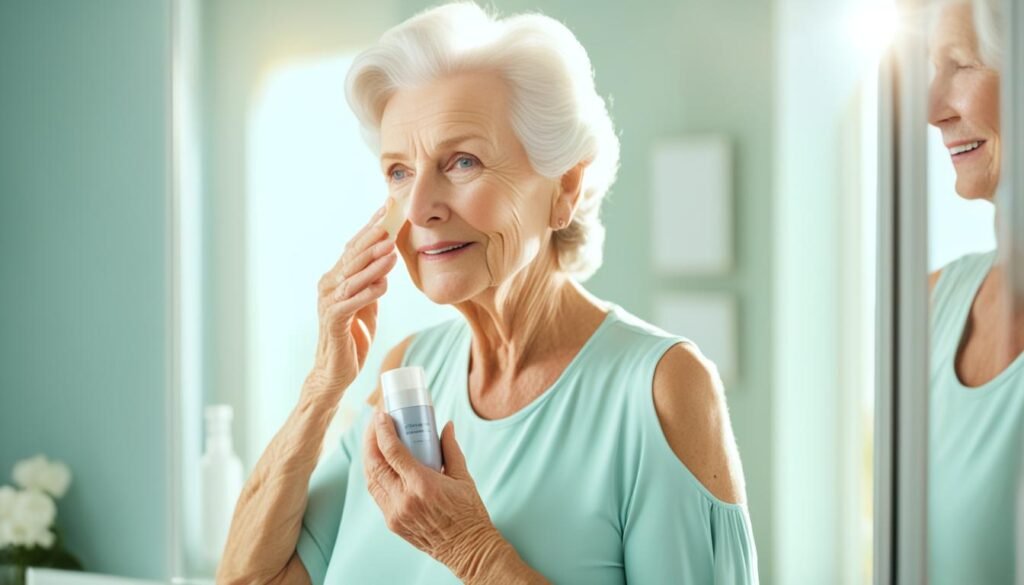
To effectively protect aging skin from the damaging effects of the sun, it is important to incorporate sunscreen into your daily skincare routine. Sunscreen is a vital step in preventing sun damage and maintaining a youthful complexion.
As part of your multi-step skincare routine for mature skin, apply sunscreen as the final step. Begin by cleansing and toning your skin, then follow up with anti-aging products such as serums and moisturizers. Finally, generously apply a broad-spectrum sunscreen to all exposed areas of your skin.
Remember to choose a sunscreen with a minimum SPF of 30 to ensure adequate protection against harmful UV rays. Additionally, opt for sunscreens that offer both UVA and UVB protection for comprehensive coverage.
Consistency is key when it comes to using sunscreen. Reapply it every two hours or more frequently if you are sweating or swimming. This will ensure continuous protection throughout the day.
Incorporating sunscreen into your anti-aging skincare routine not only shields your skin from the sun but also complements the other anti-aging products you use. By using sunscreen in conjunction with serums, moisturizers, and other anti-aging treatments, you can enhance their effectiveness and maintain a youthful complexion.
Make sunscreen a non-negotiable part of your daily skincare regimen. This simple step can go a long way in preventing further signs of aging and keeping your skin healthy and radiant.
Tips for Sun Protection Beyond Sunscreen
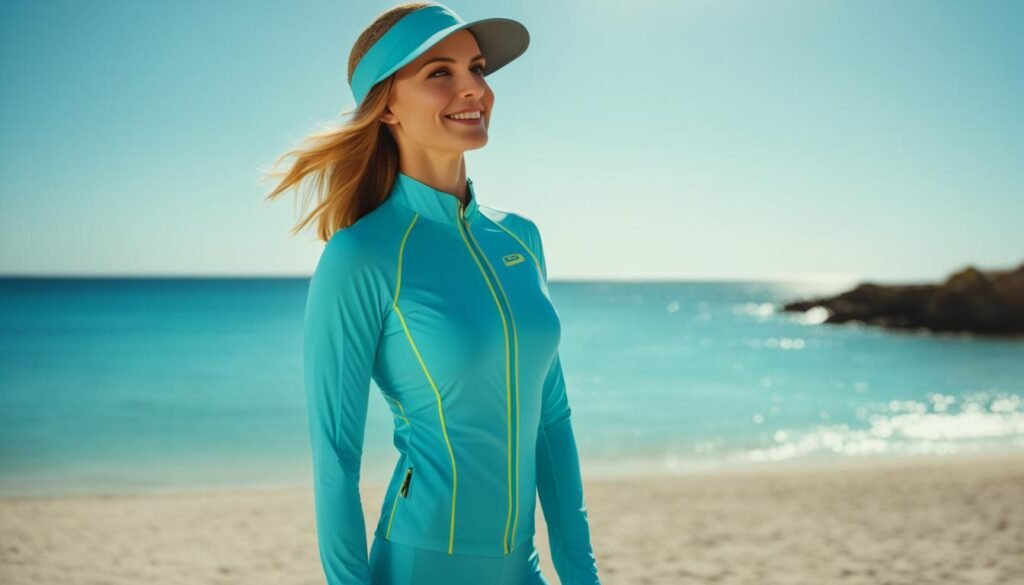
While sunscreen is an essential tool in protecting aging skin from the sun, there are additional ways to enhance sun protection. Incorporating these tips into your routine can help safeguard your skin from harmful UV rays and reduce the signs of aging.
1. Wear Sun-Protective Clothing and Accessories
One effective way to protect your skin from the sun is by wearing sun-protective clothing and accessories. Opt for long-sleeved shirts, pants, and wide-brimmed hats to cover as much skin as possible. Look for clothing with a UPF (ultraviolet protection factor) rating, which indicates the level of sun protection it provides. Additionally, don’t forget to wear sunglasses with UV protection to shield your eyes and the delicate skin around them from harmful rays.
2. Seek Shade
Seeking shade during peak sun hours, typically between 10 a.m. and 4 p.m., can provide significant protection for your skin. When you’re outdoors, try to find areas with natural shade, such as under trees or umbrellas. By avoiding direct sunlight during these hours, you can minimize the risk of sunburn and reduce sun damage to your skin.
3. Use Sun-Protective Accessories
In addition to clothing, there are specialized sun-protective accessories that can further enhance your sun protection. Consider using a sun umbrella or a parasol, especially on hot summer days when you need extra shade. These accessories can provide additional coverage and help shield your skin from direct sunlight.
4. Apply Lip Balm with SPF
Don’t forget to protect your lips from the sun’s harmful rays. Use a lip balm with a high SPF to moisturize your lips and provide sun protection. Look for lip balms that offer broad-spectrum protection against UVA and UVB rays.
5. Stay Hydrated
Keeping your skin hydrated is essential for maintaining its health and resilience. Ensure you drink an adequate amount of water throughout the day to keep your skin hydrated from within. This can help improve your skin’s natural defense against sun damage and promote overall skin health.
6. Limit Sun Exposure
While it’s important to spend time outdoors and enjoy the sun, it’s crucial to limit your sun exposure to protect your skin. Plan outdoor activities during the early morning or late afternoon when the sun’s rays are less intense. If you need to be outside during peak hours, take regular breaks in shaded areas to give your skin a break from direct sun exposure.
By incorporating these tips for sun protection beyond sunscreen into your daily routine, you can enhance your skin’s defense against UV radiation and minimize the risk of sun damage and aging. Remember, a comprehensive approach to sun protection is key to maintaining youthful and healthy-looking skin.
The Role of Antioxidants in UV Protection for Aging Skin

Antioxidants play a crucial role in protecting aging skin from UV damage. These powerful compounds neutralize free radicals, highly reactive molecules generated by UV exposure and other environmental factors. By doing so, antioxidants help prevent oxidative stress and its detrimental effects on the skin.
Free radicals are known to damage collagen and elastin fibers in the skin, leading to premature aging. This includes the formation of wrinkles, fine lines, and a loss of elasticity. By incorporating antioxidants into your skincare routine, you can counteract the damaging effects of UV radiation and maintain a more youthful complexion.
Skincare products that contain antioxidants, such as vitamins C and E, are particularly effective in providing sun damage protection. These antioxidants work to neutralize free radicals, preventing them from causing harm to the skin. Applying a sunscreen that incorporates antioxidants can further enhance UV protection for aging skin.
“Using skincare products that contain antioxidants, such as vitamins C and E, can provide additional protection against the harmful effects of UV radiation.” – Dr. Sarah Johnson, Dermatologist
In addition to topical application, incorporating antioxidant-rich foods into your diet can also contribute to UV protection for aging skin. Some dietary sources of antioxidants include berries, dark leafy greens, nuts, and seeds. These foods contain high levels of vitamins and minerals that can support overall skin health.
Skincare Products with Antioxidants
When selecting skincare products for UV protection, it is beneficial to choose those that contain antioxidants. These products can provide a two-fold defense against UV damage by combining the benefits of sunscreen with the protective properties of antioxidants.
Look for skincare products, such as moisturizers and serums, that feature antioxidants like vitamins C and E. These ingredients can help defend the skin against oxidative stress caused by UV radiation, reducing the risk of premature aging and promoting a more youthful appearance.
Dietary Sources of Antioxidants
Incorporating antioxidant-rich foods into your diet can further support UV protection for aging skin. Focus on incorporating a variety of fruits and vegetables, such as berries, citrus fruits, spinach, and kale. These foods are not only rich in antioxidants but also provide other essential vitamins and minerals for overall skin health.
Conclusion
In conclusion, UV protection is essential for maintaining the health and appearance of aging skin. The sun’s UV rays can cause significant damage, leading to wrinkles, age spots, and a loss of elasticity. To minimize the visible signs of aging and preserve a youthful complexion, it is crucial to incorporate effective UV protection strategies into your daily routine.
One of the most important steps in UV protection for aging skin is wearing sunscreen with broad-spectrum protection. Look for a sunscreen with a minimum SPF of 30 that provides defense against both UVA and UVB rays. Applying sunscreen generously and reapplying it every two hours or more frequently when sweating or swimming will help shield your skin from harmful UV radiation.
Alongside sunscreen, seeking shade during peak sun hours and wearing protective clothing, such as hats and sunglasses, can provide additional layers of defense against UV rays. Adopting a healthy lifestyle, including a balanced diet, regular exercise, hydration, and quality sleep, also contributes to overall skin health and can help delay the signs of aging.
It is recommended to consult with a dermatologist for personalized advice on UV protection for your specific skin needs. By choosing the right sunscreen and incorporating it into your anti-aging skincare routine, you can effectively minimize sun damage, maintain youthful and radiant skin, and enjoy the benefits of a well-protected complexion.
FAQ
What are the effects of UV radiation on aging skin?
UV radiation from the sun can lead to the development of wrinkles, fine lines, age spots, and a loss of elasticity in aging skin.
How can I prevent skin aging?
Strategies for preventing skin aging include wearing sunscreen, seeking shade, adopting a healthy lifestyle, and incorporating anti-aging skincare products into your routine.
Why is sunscreen important for aging skin?
Sunscreen plays a crucial role in protecting aging skin from UV damage, preventing sunburn, reducing the risk of skin cancer, and minimizing the signs of aging.
How do I choose the right sunscreen for aging skin?
When selecting a sunscreen for aging skin, consider factors such as broad-spectrum protection, formulation, and suitability for your skin type. Consulting a dermatologist can provide personalized recommendations.
What are the best sunscreens for aging skin?
Some of the best sunscreens for aging skin include EltaMD UV Clear SPF 46, Supergoop Unseen Sunscreen SPF 40, Isdin Eryfotona Actinica Sunscreen SPF 50+, Neutrogena Ultra Sheer Moisturizing Face Serum SPF 60+, and La Roche-Posay Toleriane Double Repair Moisturizer SPF 30.
How should I incorporate sunscreen into my anti-aging skincare routine?
Apply sunscreen as the final step in your routine, after cleansing, toning, and applying other anti-aging products. Reapply every two hours or more frequently if sweating or swimming.
Are there other ways to protect aging skin from the sun besides sunscreen?
Yes, you can enhance sun protection by wearing sun-protective clothing, accessories like sunglasses, seeking shade, and avoiding excessive sun exposure.
What is the role of antioxidants in UV protection for aging skin?
Antioxidants neutralize free radicals generated by UV exposure and help protect the skin from oxidative stress. They can be found in skincare products and antioxidant-rich foods.
What is the summary of UV protection for aging skin?
UV protection is vital for maintaining the health and appearance of aging skin. It involves using sunscreen, seeking shade, wearing protective clothing, and incorporating antioxidants into your routine to prevent premature aging.

